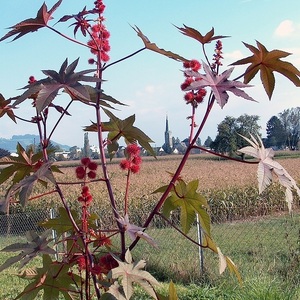Castor proteins mapped; difficult work ahead altering structure

Photo: Andreas Früh
December 2, 2013
BY University of Southern Denmark
The castor oil plant produces some very fatty beans from which oil is refined into biodiesel in several countries (e.g., Brazil). Now a team of researchers from the University of Southern Denmark along with researchers from Brazil have succeeded in mapping proteins of the bean, and thus it may now be possible to alter the bean’s structure in order to get even more out of the bean than today. The researcher’s work, however, shows that this may not be an easy task.
Countries like Brazil and India grow large quantities of the castor oil beans, which can be refined into biodiesel. Unfortunately, the beans contain allergens and also the extremely potent poison ricin, and therefore the bean pulp after extraction of the oil cannot be used for animal feed. The animals might become sick or even die from eating castor pulp.
“Therefore we are interested in finding out if it in some way could be possible to eliminate the allergenic proteins and the ricin from the beans, so that the pulp can be used for animal feed,” explained Prof. Peter Roepstorff, Department of Biochemistry and Molecular Biology at University of Southern Denmark.
Advertisement
The first step towards this has now been taken. Roepstorff and a team of Danish/Brazilian colleagues have used proteomics to map 1,875 castor bean proteins.
“Now we know where the proteins are, and we know when during bean development they are produced,” said Roepstorff. “Especially the protein ricin and the allergen 2S Albumin are interesting in this context. Unfortunately our research shows that it does not seem to be easy to get rid of them.”
Both ricin and the allergen 2S Albumin are only present in low amounts in the early development stages of the bean. But as the beans mature, the content of ricin and 2S Albumin increases.
Advertisement
“Unfortunately, the mature beans also have the highest oil content and therefore an oil producer will not harvest the beans before they are fully mature,” Roepstorff said. “The price of optimizing the oil production is that you also get a toxic and allergenic pulp that cannot be used for animal feed.”
The researchers at University of Southern Denmark work with identifying the bean’s proteins and this now makes it possible for other researchers to try and manipulate the proteins in order to remove the toxic and allergenic substances. One option may be to eliminate the unwanted proteins by plant breeding; another option is to remove them by genetic engineering.
About the castor oil plant (Ricinus communis)
An up to 12 m tall tropical plant. In temperate countries like Denmark the plant is grown for its ornamental riches in private gardens, while countries like Brazil and India grow it for its oil-rich beans. The beans are very toxic; two to 20 are enough to kill a human. The toxin, called ricin, is twice as powerful as the cobra snake’s venom, and there is no antidote. It was ricin that killed a Bulgarian defector in 1978 in London, when the tip of an umbrella delivered a deadly dose of ricin to him. In addition to biodiesel castor oil may also be used to produce nylon, brake fluids and hydraulic fluids.
Professor Peter Roepstorff has worked with protein mass spectrometry for more than 40 years and he is one of the pioneers in analyzing proteins by mass spectrometry and in proteomics.
Related Stories
The USDA reduced its estimate for 2024-’25 soybean use in biofuel production in its latest WASDE report, released May 12. The agency expects soybean oil use in biofuel to increase during the 2025-’26 marketing year.
HutanBio's microalgal biofuel production shown to be net-negative in an independent life cycle assessment by EcoAct
HutanBio on May 8 announced that the production process for its proprietary HBx microalgal biofuel achieves net-negative carbon emissions, based on an independent cradle-to-gate life cycle assessment (LCA) conducted by EcoAct.
According to a new economic contribution study released by the Iowa Renewable Fuels Association on May 6, Iowa biofuels production has begun to reflect stagnant corn demand throughout the agriculture economy.
Repsol and Bunge on April 25 announced plans to incorporate the use of camelina and safflower feedstocks in the production of renewable fuels, including renewable diesel and sustainable aviation fuel (SAF).
U.S. operable biofuel capacity in February was unchanged from the previous month, according to data released by the U.S. EIA on April 30. Feedstock consumption for February was down when compared to both January 2025 and February 2024.
Upcoming Events










